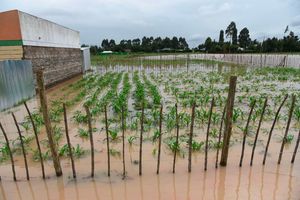The young activist promoting girls' education in Mombasa slums

Faridah Ally, founder of Mombasa-based Elimu Care, during the interview on July 19, 2023, in Kigali, Rwanda.
What you need to know:
- Faridah was born and raised in Kisauni, Mombasa County; while in high school, her father lost his job.
- The burden of raising her and her younger brother fell on their mother, who had to do odd jobs to feed and educate them.
In 2019, Faridah Ally took the stage to share the story of her life, purposely, to inspire millions of people across the world.
Engage Kenya, a platform that allows people to share stories to a live and online audience, had come to Mombasa and the co-founders had identified her as one of the speakers. That one moment turned out to be the volte-face of her life.
From a 20-year-old young woman filled with cautious optimism to a global education activist writing unbeaten hopes in the hearts of girls from low economic standards.
Faridah was born and raised in Kisauni, Mombasa County. While in high school, her father lost his job. The burden of raising her and her younger brother fell on her mother, who had to engage in odd jobs to feed and educate the family.
Her mother struggled to clear her Form One fees. In Form Two, she lost nearly five months of learning as her mother had nothing else remaining for her fees. She had to plead with the school to allow her daughter back as she found a way to clear the arrears.
Something was off though. At home, her parents were fighting and she would witness domestic violence. This tattered her mental health. Her behaviour changed. A once alluring, high-performing and obedient girl, who had been appointed a head girl, had turned into an unkempt and unruly student.
Teachers concerned
The teachers were concerned. One took it upon himself to find out the root cause of her change of behaviour. She opened up to him and the school placed her under the care of a Catholic family.
"I stayed with the family until I finished Form Four. They gave me a peaceful learning environment away from the trauma. They also paid all my high school fees,” she says.
On weekends, she would visit her parents and younger brother. Soon after she wrote her last Kenya Certificate of Secondary Education paper in 2018, her mother moved out with her brother.
“Immediately I finished Form Four, I returned home to find my mom had packed all her bags. She told me: 'You know what? I was staying here because you were still in school. Now that you have finished school, you can do anything you want. Let's go,'” she recalls.
But Faridah chose to stay with her father. Days later, she realised the environment was too toxic, so she moved out to live with her grandmother. She says her parents had no plans to enrol her in college. To keep herself busy, she engaged in volunteer work with local non-governmental organisations and youth networks.
“I did a lot of community work and through the process, I gained experience and got in touch with the realities of girls in the most underprivileged households,” she says.
“I'd meet girls out of school for lack of fees; go to my Facebook page, appeal to my fans to contribute and they did. So far, I have cleared fee areas for four students.”
Well, the book of Proverbs says: "Those who refresh others will themselves be refreshed."
It is through sharing her work in helping others during the Engage Kenya talk that a couple picked her out for support. “Courtesy of them, I joined Mount Kenya University in 2020," she says.
“They paid for my diploma in social work and community development. They paid all the fees for the three years and every month they gave me a stipend to support myself. I was, and still am, a daughter to them," she says.
In the same year, she founded Elimu Care to support girls in Bangladesh slums in Mombasa to continue with their studies amid lockdowns.
“I saw girls who were supposed to be studying playing around. While the privileged would study online, these ones had no such opportunity,” she says.
“They would neither afford the Internet nor access Internet-enabled devices or electricity. I started asking people to donate books, which I'd take to them."
Women Deliver
Faridah was among more than 600 speakers at the Women Deliver conference in Kigali, Rwanda, the largest global convening on gender equality in this era. At the plenary, she challenged governments to invest in access to free quality education.
“They should protect all girls from all forms of violence and discrimination. Once we do that, we will have given our girls self-confidence and a voice to speak for themselves, instead of [other people] speaking on their behalf," she said.





